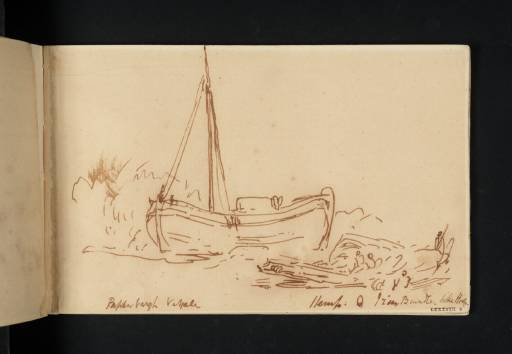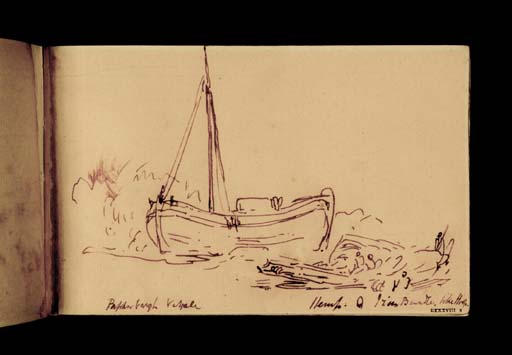Joseph Mallord William Turner A Boat from Papenburg Aground in the Surf c.1805
Image 1 of 2
Joseph Mallord William Turner,
A Boat from Papenburg Aground in the Surf
c.1805
Joseph Mallord William Turner 1775–1851
Folio 8 Recto:
A Boat from Papenburg Aground in the Surf circa 1805
D05435
Turner Bequest LXXXVIII 8
Turner Bequest LXXXVIII 8
Pen and ink on cream laid paper, 119 x 189 mm
Inscribed by Turner in ink ‘Pappenbergh Vessel’ lower left, and ‘Hemp. Iron Bundle. like Hoop’ lower right
Inscribed by Turner in ink ‘Pappenbergh Vessel’ lower left, and ‘Hemp. Iron Bundle. like Hoop’ lower right
Accepted by the nation as part of the Turner Bequest 1856
Exhibition history
1904
National Gallery, London, various dates to 1904 (535h), from ‘Studies of a shipwreck and stranded boat (eight sketches)’.
References
1904
E.T. Cook and Alexander Wedderburn eds., Library Edition: The Works of John Ruskin: Volume XIII: Turner: The Harbours of England; Catalogues and Notes, London 1904, pp.258, 634.
1909
A.J. Finberg, A Complete Inventory of the Drawings of the Turner Bequest, London 1909, vol.I, p.230, LXXXVIII 8 as ‘Storm off Coast’.
1910
A.J. Finberg, Turner’s Sketches and Drawings, London 1910, p.50.
See Introduction to the sketchbook for Ruskin’s misdating of this sketch in the National Gallery displays to ‘Turner’s period of development (1775–1800)’. Finberg read Turner’s inscription as beginning ‘Pepper (?) bargh ...’ In Sketches and Drawings, Finberg thought the ‘scenery vaguely suggests the coast of Kent ... possibly Gravesend’.
For the correct reading of Turner’s note, this writer is grateful to Pieter van der Merwe. It shows that this barge-like boat is from Papenburg, the trading and ship-building port on the Ems estuary in what was then Prussia. Her cargo, being unloaded or washed up on the shore, is said to include hemp, a material that Turner would later complain was too often imported and not sufficiently available from home.1 If the drawing dates from 1805, it predates Napoleon’s occupation of much of Prussia and his imposition, by the Berlin Decree of 21 November 1806, of the Continental System to cut off British imports and exports. On 19 November 1806, following assurances from the King of Prussia of the safety of her shipping, Britain had reciprocated with guarantees of free passage to Prussian vessels and specifically for ‘Inhabitants of the Town of Pappenburgh, whose Commerce it is His Majesty’s Intention shall be left free’.2 By 1812, there were protests that rights of passage for shipping from French-occupied countries were benefiting France at the expense of British commerce.3
Devonshire Coast, No.1 sketchbook , 1811 (Tate D08569; Turner Bequest CXXIII 105a); ‘Why should the Volga or the Russians | Be coveted for hemp why such [thus] supply’d | The sinew of our strength our naval pride | Have we not soil sufficient...’
Verso:
Blank
Inscribed by John Ruskin in red ink ‘149’ bottom left
Inscribed in pencil by Arthur Mayger Hind ‘LXXXVIII’ top left
Inscribed in pencil by Arthur Mayger Hind ‘LXXXVIII’ top left
David Blayney Brown
February 2006
How to cite
David Blayney Brown, ‘A Boat from Papenburg Aground in the Surf c.1805 by Joseph Mallord William Turner’, catalogue entry, February 2006, in David Blayney Brown (ed.), J.M.W. Turner: Sketchbooks, Drawings and Watercolours, Tate Research Publication, December 2012, https://www


